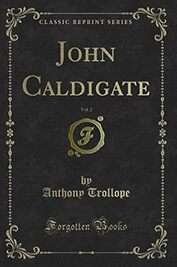
As I’m forever complaining about Trollope’s obsession with pure heroines, it’s only fair to commend him for using John Caldigate (1879) to question a man’s right to a sexual past. Caldigate is the archetypal Victorian ne’er do well. Graduating from Cambridge with eye-watering debts, he is obliged to try his luck in the Australian goldfields. On the long voyage to the Antipodes he amuses himself with Euphemia Smith, a feisty widow who is no better than she ought to be. She explains her attraction to him thus:
Women are prehensile things which have to cling to something for nourishment and support. When I come across such a one as you I naturally put out my feelers.
She is part-woman, part-cockroach, and just as tenacious. Although Caldigate’s intention is to dispose of her once they reach New South Wales, he unwisely decides to live with her while he sets about redeeming himself. After making his fortune, Caldigate sells his successful gold mine and returns to England, his newfound riches effecting a reconciliation with his father. He compounds this respectability by marrying Hester Bolton, a sweet but insipid local girl, and soon afterwards they have a child.
Caldigate’s life all seems rosy, with a safe distance of 10,000 miles between him and his colourful past. In true sensation fashion, Euphemia bursts back onto the scene, styling herself Mrs Caldigate and accusing her ex-lover of bigamy. When her attempt to blackmail him fails, the matter ends up in court and everyone’s lives are thrown into turmoil. His innocent wife and child are exposed to public humiliation, as many are quick to judge this previously dubious character. Caldigate has his love life analysed almost forensically and he is forced to account for his previous actions, in a manner normally reserved for unfortunate heroines. Making brilliant use of his professional expertise, Trollope contrives that the case hinges on the proof of a forged postmark, sending the intrepid Mr Bagwax to hunt down evidence in Australia.
John Caldigate features one of Trollope’s most elaborate and satisfying plots, with many unexpected twists and turns. By making his anti-hero almost unlikeable, the author draws the reader’s attention to the story itself, this detachment providing a greater perspective on unfolding events. A particular highlight is Hester Bolton’s fanatically religious mother, who attends her daughter’s wedding dressed in mourning and speaks almost entirely in biblical quotes. Victoria Glendinning describes her as “a woman who thought it wicked not to be uncomfortable”. 1
I shan’t spoil the ending, as this one of the few novels in which Trollope doesn’t make the conclusion clear from the outset. It’s a clever psychological tale and deserves more recognition for its verve and originality.
John Caldigate by Anthony Trollope
Trollope by Victorian Glendinning ↩︎